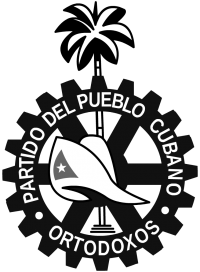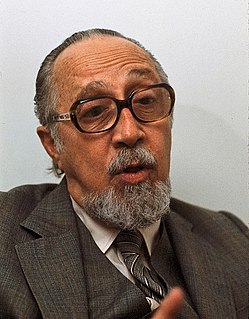
Fulgencio Batista y Zaldívar was a Cuban military officer and politician who served as the elected president of Cuba from 1940 to 1944 and as its U.S.-backed military dictator from 1952 to 1959, when he was overthrown by the Cuban Revolution.

Carlos Manuel Prío Socarrás was a Cuban politician. He served as the President of Cuba from 1948 until he was deposed by a military coup led by Fulgencio Batista on March 10, 1952, three months before new elections were to be held. He was the first president of Cuba to be born in an independent Cuba and the last to gain his post through universal, contested elections. He went into exile in the United States, where he lived for 25 years before dying by suicide at age 73.

The Communist Party of Spain is a Marxist-Leninist party that, since 1986, has been part of the United Left coalition, which is part of Unidas Podemos. It currently has two of its politicians serving as government ministers in the Spanish government, in the roles of Minister of Labour and Social Economy and Minister of Consumer Affairs respectively.

The Brazilian Communist Party, originally the Communist Party of Brazil, is a communist party in Brazil founded on 25 March 1922 which makes the disputed claim of being the oldest political party still active in the nation. It played an important role in the country's 20th-century history despite the relatively small number of members. A factional dispute led to the formation of PCdoB in the 1960s, though both communist parties were united in opposition to the Brazilian military government that ruled from 1964 to 1985. But with the fall of the Soviet Union and the collapse of communism circa 1990, the party lost power and international support. An internal coup in 1992 divided the party and formed a new party, called Popular Socialist Party, using the former identification number of the PCB, 23. That party has since moved towards the centre and now goes by the name Cidadania.
The Liberal Party of Cuba, was one of the major political parties in Cuba from 1910 until the Cuban Revolution in the late 1950s, when it was exiled.
This article gives an overview of liberalism in Cuba. It is limited to liberal parties with substantial support, mainly proved by having had a representation in parliament. The sign ⇒ means a reference to another party in that scheme. For inclusion in this scheme it isn't necessary so that parties labeled themselves as a liberal party.

Vittorio Vidali, also known as Vittorio Vidale, Enea Sormenti, Jacobo Hurwitz Zender, Carlos Contreras, and "Comandante Carlos", was an Italian communist. After being expelled from Italy with the rise of Fascist Benito Mussolini, he went to Moscow, where he became an operative for the Soviet Comintern. He was sent to Mexico, where he was implicated in at least two assassination attempts – of Cuban communist Julio Mella and Russian Leon Trotsky, there in exile. Later Vidali was active in other locations, finally leading the new communist part in the Free Territory of Trieste beginning in 1947 after World War II. He later represented the community in Parliament after it was annexed by Italy.

Julio Antonio Mella McPartland was a Cuban political activist and one of the founders of the original Communist Party of Cuba. Mella studied law at the University of Havana but was expelled in 1925. He was working against the government of Gerardo Machado, which had grown increasingly repressive. Mella left the country, reaching Central America. He traveled north to Mexico City, where he worked with other exiled dissidents and communist sympathizers against the Machado government. He was assassinated in 1929, but historians still disagree on which parties were responsible for his death. The 21st century Cuban government regards Mella as a communist hero and martyr.

The Party of the Cuban People – Orthodox, commonly shortened to the Orthodox Party, was a Cuban populist political party. It was founded in 1947 by Eduardo Chibás in response to government corruption and lack of reform. Its primary aims were the establishment of a distinct national identity, economic independence and the implementation of social reforms.

The Cuban Revolutionary Party – Authentic, commonly called the Authentic Party, was a political party in Cuba most active between 1933 and 1952. Although the Partido Auténtico had significant influence, it eventually became unpopular due to corruption scandals and, despite significant reforms, Fulgencio Batista returned to power after a coup d’etat.
Fabio Grobart was a Marxist-Leninist revolutionary and politician who played an important role in the 1959 Cuban Revolution that overthrew Fulgencio Batista and led to Fidel Castro's rise to power.

Carlos Rafael Rodríguez Rodríguez was a Cuban Communist politician and economist, who served in the cabinets of presidents Fulgencio Batista and Fidel Castro.

Blas Roca Calderio was a Cuban politician and Marxist theorist who served as President of the National Assembly of People's Power in Cuba from 1976 to 1981. He was also head of the pre-1959 revolution Communist Party of Cuba for 28 years and editor of the communist newspaper Hoy. He was a signatory of the Cuban Constitution of 1940 and chaired the committee that wrote the country's first socialist constitution in 1976.

General elections were held in Cuba on 14 July 1940. Fulgencio Batista won the presidential election running under the People's Socialist Coalition banner, whilst the Partido Auténtico emerged as the largest party in the House of Representatives. Voter turnout was 73.4%.
The Popular Socialist Youth was a youth organization in Cuba, the youth wing of the Popular Socialist Party. Raúl Valdés Vivó was the general secretary of the organization. By 1960, the organization was estimated to have around 13,000 members. Raúl Castro was a member of the organization for some time.

General elections were held in Cuba on 1 June 1948. Carlos Prío Socarrás won the presidential election running under the Auténtico-Republican Alliance banner, whilst the Partido Auténtico emerged as the largest party in the House of Representatives, winning 29 of the 70 seats. Voter turnout was 78.7%.

The Communist Party of Cuba is the sole ruling party of Cuba. It was founded on 3 October 1965 as the successor to the United Party of the Cuban Socialist Revolution, which was in turn made up of the 26th of July Movement and Popular Socialist Party that seized power in Cuba after the 1959 Cuban Revolution. The party governs Cuba as an authoritarian one-party state where dissidence and political opposition are prohibited and repressed. The Cuban constitution ascribes the role of the party to be the "leading force of society and of the state".
The Democratic Socialist Coalition was a Cuban political coalition, led by Fulgencio Batista. The party was founded in 1939, and served for the 1940 general elections, won by Batista. The founding parties and members were four: the Liberal Party (liberal), the Nationalist Union Party (conservative), the Communist Revolutionary Union (communist), and the Democratic National Association (conservative).

Sandalio Junco Camellón (1894-1942) was a Cuban Afro-Latino labor figure and communist radical. Having started out as a trade unionist, Junco rose through anarcho-syndicalist organizations to fight for the interests of workers throughout Cuba. After going into exile following arrest, Junco travelled from Mexico to South America to the Soviet Union, developing and advocating his views in the interest of workers and people of color. Upon his return to Cuba, his involvement and eventual work against the Stalinist- aligned Cuban Communist Party established him as the "father of Cuban Trotskyism." Junco was assassinated on May 8, 1942, by members of the Communist party.

Juan Marinello Vidaurreta was a Cuban Communist intellectual, writer, poet essayist, lawyer and politician. He was one of the most prominent Cuban intellectual figures of the interwar period and post revolutionary Cuba.
















